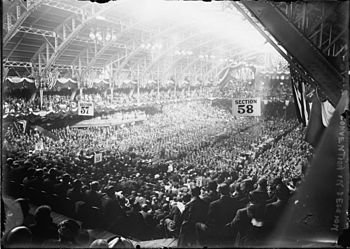
Donald Trump, the Republican Party’s presumptive presidential nominee, is heading toward July’s national party convention with a majority of delegates (as “bound” by state primaries and caucuses) in hand. But ever since it became clear that he would garner that majority, both he and the GOP leadership have spent a good deal of time trying to snuff out talk of a floor revolt by those delegates against his nomination and in favor of some other candidate’s.
“The Republican National Committee put out a statement ‘you can’t do it, it’s not legal, you can’t do it, you’re not allowed to do it,'” says Trump.
Is Trump right? Is it “illegal” for the delegates to do what they want instead of what Trump and the RNC claim the rules demand?
In a word, no.
Keep in mind that at a national convention, the delegates run the national committee, not the other way around. They make the rules. They can change the rules. They can suspend the rules. And even the rules as written leave room for a revolt.
In order to receive the nomination, Republican National Convention rule 40(d) requires a candidate to receive a majority of “the votes entitled to be cast.” In other words, the votes of a majority of the total number of registered delegates, not just of a majority of the delegates who happen to actually vote.
Rule 16, section 2, forbids the convention’s secretary to recognize the vote of a delegate bound to a particular candidate by a primary or caucus outcome if that vote is cast for another candidate … but no rule requires a delegate to vote at all.
If enough Trump-bound delegates with “votes entitled to be cast” decline to vote on the first ballot, Trump won’t get a majority on that ballot. And on subsequent ballots, delegates are no longer bound to candidates — they can vote for their nominee of choice.
100% possible, 100% legal … but how likely? Well, that depends on the party’s leadership.
Party officials enjoy quite a bit of power at conventions. At the recent Libertarian National Convention, there were times when a “quorum call” (a head count to ensure enough delegates are present to legally do business) would have resulted in adjournment. There were calls from the floor to make that happen … but the chair apparently just didn’t hear them (I’m sure you get my meaning). Supporters of Ron Paul’s 2008 and 2012 Republican presidential campaigns still complain about the party establishment’s dirty parliamentary tricks at caucuses and conventions.
The likelihood of a delegate revolt in Cleveland is really mostly a matter of whether or not Reince Priebus and Company WANT a delegate revolt in Cleveland. On that question, your guess is as good as mine.
Thomas L. Knapp (Twitter: @thomaslknapp) is director and senior news analyst at the William Lloyd Garrison Center for Libertarian Advocacy Journalism (thegarrisoncenter.org). He lives and works in north central Florida.
PUBLICATION/CITATION HISTORY
- “Yes, a GOP Delegate Revolt is Possible,” by Thomas L. Knapp, OpEdNews, 06/30/16
- “Yes, a GOP Delegate Revolt is Possible,” by Thomas L. Knapp, Key West: The Newspaper [Florida], 07/01/16
- “Yes, a GOP Delegate Revolt is Possible,” by Thomas L. Knapp, CounterPunch, 07/01/16
- “Yes, a GOP delegate revolt is possible,” by Thomas L. Knapp, Bucks County, Pennsylvania Courier Times, 07/01/16
- “Yes, a GOP Delegate Revolt is Possible,” by Thomas L. Knapp, Ventura County, California Citizens Journal, 07/01/16
- “Yes, a GOP delegate revolt is possible,” by Thomas L. Knapp, Westerly, Rhode Island Sun, 07/02/16
- “Yes, a GOP Delegate Revolt is Possible,” by Thomas L. Knapp, Uintah Basin, Utah Standard, 07/05/16


